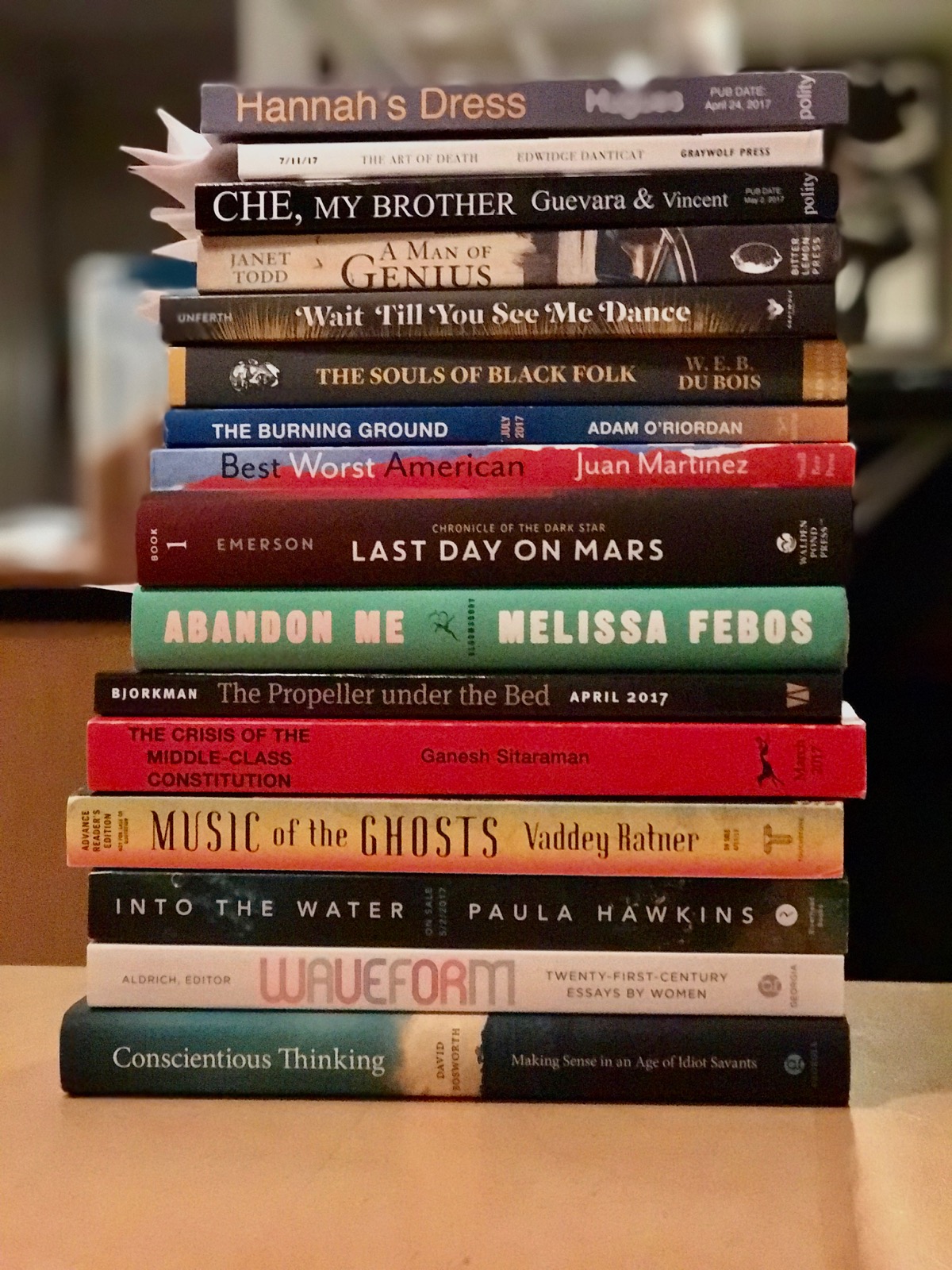The Future Alternative Past: it's all about the L.O.V.E.
Every month, Nisi Shawl presents us with news and updates from her perch overlooking the world of science-fiction, fantasy, and horror. Read past columns here
Love Makes Our Worlds Go Round
The first story published in the SFFH series I mentioned last month, the Slate Magazine series on life under Presiden Trump, is a love story: Hector Tobar’s “The Daylight Underground.” Love moves the immoveable, and SFFH is rife with its primal and paradoxical power. Sometimes love is the motivation for the accomplishment of impossible journeys, as in John Crowley’s post-apocalyptic novel Engine Summer: hero Rush that Speaks traverses time and the troposphere in search of his lost love, Once a Day. Sometimes love’s workings are changed by a story’s science fictional or magical or horrific elements, as in Octavia E. Butler’s Fledgling, her last novel, in which a predator builds a polyamorous romantic relationship with its prey. Or as in C.J. Cherryh’s Foreigner series, in which a human linguist’s sexual involvement with his nonhuman bodyguard gradually adapts to very different emotional defaults rooted in their distinct biologies. Sometimes love is the means by which science fictional or magical or horrific change is brought about: in Ursula K. Le Guin’s groundbreaking novel The Left Hand of Darkness, ambisexual politician Estraven’s desire for male ambassador Genly Ai contributes to Estraven’s gender transformation.
There are plenty of other intersections between SFFH and love — even if we restrict our definition of love to the sort that’s sexual and romantic. Love and the fantastic imagination are twined together in a very twisty knot.
Often we fantasize privately about love — we dream impossibly erotic dreams, tell ourselves “meet-cute” stories that have no chance of ever coming true, and watch porn movies in our heads that we know we’ll never film. SFFH’s public fantasies have to have a greater degree of verisimilitude.
One of my favorite SFFH books-to-read-with-one-hand is Margaret and I by Kate Wilhelm. An Amazon reviewer called it “a profoundly unsettling and hallucinatory exploration of a woman’s sexual and emotional self-realization.” My note on the first page of my vintage 1978 paperback says it’s “good, and hot too!” Wilhelm’s undated inscription (probably circa 1999, when we met) informs me that I was “too young the first time around.” Surely not — when Margaret and I originally came out I was almost 16.
As for the less carnal sorts of love, when I want to swoon over the ideal knight, I read Tanith Lee’s Cyrion, or another novel-in-short-stories she wrote, Kill the Dead, or her somewhat-problematic romanticization of chattelhood, The Silver Metal Lover. When I want to get all starry-eyed over a lady, I turn to the strong and endearingly pessimistic heroines of Joanna Russ’s The Female Man and The Two of Them.
Then there are authors providing what you might call reliable surprises: Samuel R. Delany, who can write lyrical passages about the joy of snot-eating and the richly erotic pleasures to be found in cutting up raw potatoes. And Kai Ashante Wilson, who blows my professional author defenses to smithereens with rude yet gently balmy whisperings about entanglements between princes and soldiers and dead musicians.
Then there’s Lara Elena Donnelly’s debut novel Amberlough.
Recent books recently read
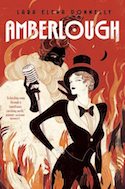
Love and sex drip from the pages of Amberlough (Tor) like mead from the rim of an upended bottle: sweet, yeasty, and bound to bring on fever-filled dreams. Set in an imagined secondary world similar to our own, this tale of espionage aimed against a Nazi-style populist movement is all too relevant to the current moment. Statuesque drag queen Aristide so truly loves twinkish spymaster Cyril DePaul that he fixes him up with a pseudo-girlfriend in the form of the frankly polyamorous Cordelia Lehane, Aristide’s costar at the decadent Bumble Bee Café. As in Ellen Kushner’s Riverside series, there’s no magic per se to be found within the pages of this fantasy of bedside manners, only the stinging fascination of seeing heart-stealing characters play out their desperate gambits against an ever-so-slightly defamiliarized background. From the slang for cigarettes (“straights” rather than “fags”) to streetcar-riding butch lesbians dodging brawling fascist demonstrations, Donnelly provides plenty of second-worldly details. It’s the sensual ones that stick, though: a breath, and then a knee parting thighs and then another, softer breath. The sights and sounds of a temporary heaven on earth.
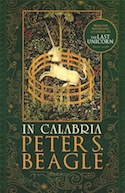
In Calabria (Tachyon Publications), Peter S. Beagle’s story of an Italian farmer encountering a gravid unicorn, is reminiscent of his 1968 masterpiece The Last Unicorn. But the new book emphasizes the interior transformations caused by this mythical animal. A simultaneous affair between 50-ish widower Claudio Bianchi and a fierce motorcyclist young enough to be his daughter reads alternately as metaphor for the irrationality and vulnerability of love and as simple wish fulfillment. The unicorn colt’s sire, black and furious, appears near the book’s end as counterbalance to the dam’s white beauty, a compelling vision of the positive masculine principle lacking in Beagle’s early work.
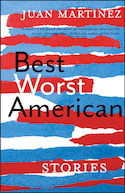
Readers of McSweeney’s Internet Tendency and the mainstream literary scene’s many small, high-prestige magazines may be familiar with Colombian American author Juan Martinez. Best Worst American (Small Beer Press), however, is his SFFH debut. Faithful to the transparency of contemporary genre-adjacent practices — simple statements of the unlikely, repeated refusals to linger on any comfortable thought or image — Martinez can still manage to impinge directly on the genre of SFFH itself via his subjects: immortal strippers, the end of the world, suburban housing developments empty of everything except myriad ghostly stillbirths. Brevity is another hallmark of modernity, but though this slim volume is filled with sleek, bold flash, its longer stories are also intensely affecting. “Hobbledehoydom” examines gracelessness in love in the light of Victorian novelist Anthony Trollope’s sad self-diagnosis. “Errands” follows an unfilial nine-year-old on a shopping trip through the forest where her parents live. Weirdness builds upon delectable weirdness throughout the whole book.
Cons and the conlike
The International Conference on the Fantastic in the Arts blends academic conference and SFFH convention together, and the result is a warm, salty success. Every March scholars and professional writers gather at the Orlando Airport Marriott Lakeside to explore fiction that flows along courses more outré than literature’s mainstream. A robust programming track includes dissertations on clones, robots, vampires, and the philosophical questions raised and answered by their imagined existence. There arealso readings by writers and panels on which they expound on their work — my favorite pronouncement being Ted Chiang’s description of himself as “entirely stitial.” Plus the pool’s lovely, the bar’s relaxed, and the alligator keeps her distance.
Ted’s remark, in case you missed his reference, was made in response to the label “interstitial.” Fiction which is interstitial occupies the notional territory between genres, and FOGcon 7’s theme is “Interstitial Spaces.” This new Bay Area convention welcomes authors Delia Sherman and Ayize Jama-Everett as its “Honored Guests,” and would like to welcome you as well. Highlights include the annual “Unaward Banquet” and Clarion-style writing workshops.
Thursday Comics Hangover: Product of the 80s
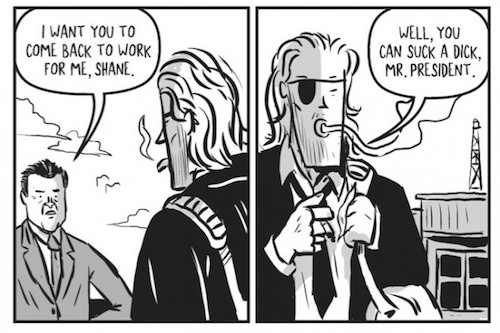
Early in Sexcastle, a random goon threatens Shane Sexcastle by asking, "You ever hear the phrase 'You brought a knife to a gun fight?'"
Sexcastle responds, "This is worse than that. You brought a you to a me fight."
Sexcastle was first published almost two years ago, but it had escaped my attention until the good folks at Phoenix Comics turned me on to it last night. I was interested in an upcoming comic called Rock Candy Mountain about a hobo’s epic journey by a cartoonist named Kyle Starks, and they happened to have his first book in stock. It’s pretty fantastic.
Shane Sexcastle, the star of Sexcastle, is basically the protagonist of the world’s biggest 80s action movie — Patrick Swayze in Roadhouse blended with Kurt Russell in Big Trouble in Little China, and then garnished with basically everyone who ever starred in an Expendables movie. He’s trying to start a new life working for a single mom florist, but he keeps getting pulled back in to a circle of violence.
Sexcastle is not especially witty. It’s a comedy that revels in the over-the-top violence of 80s action movies, but it doesn’t have the slyness or the critical eye of, say, Punch to Kill. It’s a fan’s celebration of a particular genre, and though Starks is a brilliant cartoonist — he can squeeze more action onto a single page than most Marvel Comics artists can fit into a single issue, and he can make it easier to follow besides — he’s not especially complex with the writing.
And that’s okay. Sexcastle doesn’t need to be deep. It’s funny and it’s imaginative and it’s expertly put together. On an otherwise slow week at the comics shop, that’s more than enough to win my allegiance.
Book News Roundup: The librarians strike back
- Have you read Seattle Public Library City Librarian Marcellus Turner's open letter to the community yet? It's very good:
We celebrate Seattle's diversity and strive to ensure that all people feel welcome in the Library. We are committed to meeting the needs and expectations of every Library patron regardless of race, ethnicity, religion, culture, sexual orientation, beliefs, or income. The Seattle Public Library actively supports efforts that combat prejudice, stereotyping and discrimination.
- Speaking of librarians classily sticking it to President Trump, this Seattle Times story from Jerry Large about a school librarian teaching kids how to identify and respond to fake news is very good:
Besides running the library, [Lakeside School librarian Janelle] Hagen said, she teaches a class called “digital life.” She meets with fifth-graders twice a week and with eighth-graders once a week. The classes are a mix of technology and information-literacy skills, but since the presidential election, she’s increased the focus on the latter.
- Seattle art critic (and, full disclosure, my dear friend) Jen Graves announced on Twitter this morning that she has resigned from The Stranger:
I spent months resisting the reality that The Stranger is not currently a viable place for me to do the work I've always cared about.
— Jen Graves (@JenGraves) February 8, 2017
- Graves was shortlisted for a Pulitzer Prize in 2014. If you're not familiar with Graves's work, or if you need a refresher on why she's such an exceptional writer, you should read Cate McGehee's wonderful review of Maggie Nelson's book The Argonauts that serves as an appreciation of Graves:
I consider Nelson one of my own mothers, as do many women I know. Another mother-to-many is the art critic Jen Graves, who’s been been writing for The Stranger for over ten years, bringing two English degrees and a keen eye for personal appearance to her weekly reviews.
Today and next Wednesday, Northwest Film Forum is hosting screenings of I Think You Are Totally Wrong: A Quarrel, James Franco's documentary about a conversation between UW writer David Shields and his collaborator Caleb Powell. Powell is in attendance tonight; Shields will appear in conversation with Charles Mudede next week.
On Monday, we profiled outgoing University Book Store remainder buyer Mark Mouser. Coincidentally, author Warren Ellis recently wrote about the joy of finding one of his books on a remainder table.
If you're looking to promote quality journalism about video games, this collection of video game writing from the website Offworld is a gorgeous object celebrating quality writing in a space that is particularly prone to rewarding access-journalism hacks.
Political cartoonist Clay Bennett had his cartoon stolen and manipulated by a right-wing jackass on Twitter. When Bennett called the jackass out, the jackass had the nerve to say he'd sue Bennett. Ugh.
Farrar Straus Giroux editorial director Joy Peskin wrote a great editorial about Simon & Schuster's decision to publish the work of white nationalists:
I’m from the children’s book world, and you may think this shouldn’t concern me. A children’s imprint isn’t going to sign Richard Spencer’s Alt-Right Bedtime Storybook—at least I hope not. But as a publishing professional and a citizen of this country, I would ask my colleagues on the adult side to think long and hard about future publishing deals that give a mainstream platform to the so-called alt-right and their so-called alternative facts. When a major publisher legitimizes old-fashioned hate and lies rebranded as alternative, our authors lose, our books lose, and our country loses.
- Congratulations to Magazine of the Year winner Mother Jones.
Your Week in Readings: The best literary events from February 8th - February 14th
Wednesday February 8th: Life in a Fishbowl and Nowhere Near You Reading
Your week in readings kicks off with two young adult writers debuting their newest books. The latest book in Leah Thomas’s “Blunderkids” series featuring super-powered teenagers involves “an eyeless boy who prefers to be alone.” Len Vlahos’s novel is about a reality show featuring a family whose father who is dying of brain cancer. University Book Store, 4326 University Way N.E., 634-3400, http://www2.bookstore.washington.edu/. Free. All ages. 7 p.m.Thursday February 9th: 4 3 2 1 Reading
See our Literary Event of the Week column for more details. Town Hall Seattle, 1119 8th Ave., 652-4255, townhallseattle.org. $38. All ages. 7:30 p.m.Friday February 10th: Bushwick Book Club: Americanah
Chimamanda Ngozi Adichie’s Americanah is one of the greatest novels to be published in the last five years. Actually, probably the last decade. Maybe the last 25 years? Seems likely. Tonight, Seattle musicians present new work based on the most recent Greatest American Novel. If they rise to the material, this will be a night to remember.Elliott Bay Book Company, 1521 10th Ave, 624-6600, elliottbaybook.com . $10. All ages. 7 p.m.Saturday February 11th: Mason Bee Revolution Reading
Remember in the days before Trump when we were all worried about the rampant death of bees? Well, even though we’re distracted by a different kind of apocalypse, bees are still dying in great numbers. Washington authors Dave Hunter and Jill Lightner explain how and why you should set up your own home bee colony Lake Forest Park, 17171 Bothell Way NE, 366-3333, thirdplacebooks.com. Free. All ages. 6:30 p.m.
Sunday February 12th: Born in Seattle Reading
Two Seattle authors who have written books about America’s need to redress our shameful history of Japanese internment read here tonight. Bob Shimabukuro wrote Born in Seattle: The Campaign for Japanese American Redress. Mira Shimabukuro wrote Relocating Authority: Japanese Americans Writing to Redress Mass Incarceration. They are father and daughter. Elliott Bay Book Company, 1521 10th Ave, 624-6600, elliottbaybook.com . Free. All ages. 3 p.m.Monday February 13th: Ask the Oracle
The Sorrento Hotel and Hugo House’s whimsical series continues tonight with Claudia Rowe, author of the great, creepy book The Spider and the Fly, environmental poet JM Miller, and novelist Randy Sue Coburn. They will divine answers to audience questions from their own books Sorrento Hotel, 900 Madison St., 622-6400, hotelsorrento.com. Free. 21 and over. 7 p.m.Tuesday February 14th: What Is Love? Reading
Just in time for Valentine’s Day, philosopher Carrie Jenkins brings her book What Is Love? to Town Hall. She investigates the idea of romantic love in modern society. Jenkins applies her own polyamorous perspective to the concept of love, which will likely make this reading one of the most interesting Valentine’s Day dates you’ve ever attended. Town Hall Seattle, 1119 8th Ave., 652-4255, townhallseattle.org. $5. All ages. 7:30 p.m.Five books from Seattle-area authors to look out for this spring
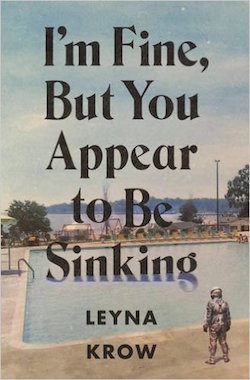
I’m Fine But You Appear to Be Sinking, by Leyna Krow
Here’s the opening paragraph of Spokane writer Leyna Krow’s story “Disruption:”
Each morning, a man in Detroit, Michigan pushes a button and everything falls out of my kitchen shelves and onto my kitchen floor. It is unclear to me if this is the primary function of the button or if it’s simply an unintended consequence. Regardless, I find it to be an inconvenience.
Krow’s debut collection is full of stories like that in which the weird hate-fucks the banal, or vice versa. Krow’s protagonists all assume that the universe is rigged against them; the only question left is if the universe is bored or just an asshole. Out February 14th through Featherproof Books
Up South, by Robert Lashley
Bellingham poet Lashley had a pretty great 2016, professionally speaking. He shared a stage with Sherman Alexie and EJ Koh twice, he was nominated for a Stranger Genius Award, and he read all over Seattle all year long. He’s not stopping the momentum in 2017: his second collection of poetry, Up South, is being published this spring, and he’ll likely be promoting it all around the region. The selections from Up South that Lashley has read so far have been more classically oriented than the work in his debut The Homeboy Songs, but they’re no less clever…or angry. Expect some next-level craft. Out March 27th through Small Doggies Press
Ghosts of Seattle Past, edited by Jaimee Garbacik
Over the last few years, we’ve all lost parts of Seattle that we dearly love. Rather than just complain on Facebook about it the way the rest of us do, editor Jaimee Garbacik decided to collect the lost-Seattle stories of local writers (full disclosure: I contributed an essay) and community leaders and compile them into a book. Even if Seattle nostalgia exhausts you, Ghosts will at least help you understand that a city is not just its storefronts or its luxury apartments: every city is also made up of people, and the places that are not there anymore. Out April 11th through Chin Music Press
A Year Right Here: Adventures with Food and Family in the Great Nearby, by Jess Thomson
A Seattle-area cookbook author decides to spend a year eating like a (hyper)local in this hybrid memoir/cooking essay/work of reportage. Jess Thompson tracks down the Northwest’s best delicacies — including razor clams, mushrooms, and wine — with her five-year-old son, a picky eater who has cerebral palsy. As they track down local delicacies, they slowly come to a new understanding of each other, bonding the way most American families do: over food. Part road trip, part parenting book, part cookbook, A Year Right Here could very well be either the next great Seattle memoir or a too-sentimental schmaltz-bomb. Only one way to find out! Out April 13th through University of Washington Press
Water & Salt, by Lena Khalaf Tuffaha
Redmond poet Lena Khalaf Tuffaha is a first-generation Arab-American with roots in Syria, Palestine, and Jordan. Her heritage figures strongly throughout her work — her manuscript Arab in Newsland won the 2016 Chapbook Prize from local publisher Two Sylvias Press — and she is not afraid to be political. In 2014, Tuffaha’s published a poem titled “Running Orders” to her Facebook page. The poem immediately went viral, and it’s easy to understand why: it begins like an action movie, with a mysterious phone call telling the reader to “Run,” and it ends with Tuffaha’s demand that the reader “Prove you’re human./Prove you stand on two legs.” Seems about right for the Trump era. Out April 27th through Red Hen Press
Literary Event of the Week: Paul Auster reads 4 3 2 1 at Town Hall Seattle
The thing about literature is that as one generation of giants fall, there’s always another ready to take its place. The most recent winter of titans concluded when John Updike passed away and Philip Roth announced his retirement. We’ve got a young generation on the rise with Zadie Smith and Chimamanda Ngozi Adichie. But the generation now at the height of its power includes names like Don DeLillo and, most especially, Paul Auster.
Every bookstore’s new arrival table is always groaning under the weight of at least one densely packed novel written by an enthusiastic young male author who aspires to join the ranks of Auster and Adichie and Updike. You know the kind of novel I’m talking about: the one that tries to thematically pack the entire universe between two covers, even as it aspires to dazzle the critics with ostentatious acts of linguistic gymnastics. It’s at least 800 pages. And it will be forgotten in 18 months or less, because those kinds of elephantine, cram-the-world-into-a-book books make for lousy debut novels.
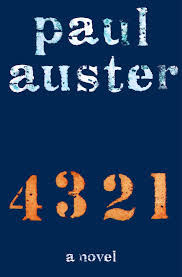
Unlike those dense books by shallow talents, Auster’s first novel in seven years, 4 3 2 1, reflects the craft and the soulfulness that he has invested in his work for the last three decades. It’s a big gorilla-choker of a novel with a massive scope that earns its high concept. In brief, it’s the story of the life of Archibald Isaac Ferguson, the grandson of Russian Jews who came to New York City in search of their own sliver of American success. But in practice, it’s much more complicated than that.
In a series of eight long chapters, 4 3 2 1 cracks Ferguson’s story into quarters. Auster follows Ferguson’s life through four alternate timelines. He runs these lives in parallel, and it’s like a master composer applying variations to a theme. In some of the timelines, Ferguson is successful. In others, he’s a failure. In some of his lives, he falls in love and grows as a person. In other lives, he breaks bones and ruins relationships.
4 3 2 1 builds on questions that Auster has asked again and again in his work since he first published his New York Trilogy: how much of our lives are constructed on top of the quicksand of coincidence? Can there be such a thing as a successful life? Do we ever really learn lessons? Auster writes his usual metafictional intercessions into the text — Ferguson was born exactly one month after Auster, in the same city — but here they feel less like Auster’s typical commentary on the bizarreness of the act of reading and more like a deep bow toward autobiography.
At nearly 900 pages, this is a big book whose every page is earned. It’s a story by a novelist who is still learning and aspiring and interacting with literature. And Auster’s not done leaving his giant footprints on the earth. In the middle of January, Auster told The Guardian that he believed Donald Trump’s election to be “the most appalling thing I’ve seen in politics in my life,” and he made a vow: “I’m going to speak out as often as I can, otherwise I don’t think I can live with myself.” He’s not done with us yet.
All happy families are alike
Published February 07, 2017, at 1:01pm
Novels are amazing engines of social change, and Seattle author Laurie Frankel's latest is a generous, charming example of a good book that can do good.
Now Playing: James Baldwin's brilliance and heartbreak
James Baldwin is at the center of the new documentary I Am Not Your Negro, but it’s not a biography. Instead, it’s an essay about the history of race in America composed posthumously from Baldwin’s notes. Baldwin is at the center of the film; it’s constructed around his narration (voiced by Samuel L. Jackson) and his televised appearances serve as supplementary arguments. He shares his own story, but he only uses it as an example of the larger African-American experience.
It’s been a long time since I’ve seen a documentary as carefully constructed as I Am Not Your Negro; it builds an argument with literary precision. Director Raoul Peck complements the words with unsettling images, the parts of history that most would consider to be too uncomfortable to recall: racist advertisements, old films with cringe-worthy stereotypes of African-Americans, the bodies of people killed by lynching and gunshot.
The film opens with Baldwin lamenting the deaths of his three of his contemporaries: Medgar Evers; Martin Luther King, Jr.; and Malcolm X. Through those three men, Baldwin explores the African-American story of the mid-20th century — the differing philosophies and backgrounds and religions that made up a multifaceted movement that often gets glossed over in high school history classes.
But the central perspective of the film is Baldwin’s. He’s weary and brilliant and powerful, and he believes in something better, even as he deeply understands the injustice that is at the heart of the American bargain. This is a film that is worthy of him.
Invocation
And God said "… I'm lonely
I'll make me a world."
— James Weldon Johnson
"The Creation"Tell us your stories
August WilsonRemind us
of the voices you hear
Boy Willie
Ma Rainey
Aunt Esther's childrenBring forth for us
the visions you hear
King Hedley
Fences
Two Trains RunningConjure up for us
Langston's words
"Life for me ain't been
no crystal stair, but
I's climbin"August Wilson
keep dippin' your fingers
in the waters
Tell Freedom
We'z ready
Take our love
with you
Take our lovefor Constanza
& all of us
Deadline is approaching fast for applying to Mineral School

Time is running out to apply to Mineral School for their 2017 residencies. Especially of interest to parents is a new series funded by the Sustainable Arts Foundation. Thanks to that support, they're offering funded weeks at Mineral School, including room, board, visiting author readings, and tons of privacy and workspace to get the ideas in your head out into the world.
Find out more, and read a story of a Mineral School alumni, on our sponsors page.
But of course, Mineral School has many more residencies available, and you should really go take a look at all of the options. Don't miss your chance to spend time in one of the most unique writing retreats in the Pacific Northwest.
Mineral School, and sponsors like them, pay for all the content you see on this website. Thanks to them we can pay poets, writers, and artists to help us make the Seattle Review of Books the best it can be. Did you know you can be a sponsor too? Find out more on our sponosrship page, and please consider letting our readers know about your work.
There are plenty of great causes that deserve your donations and your time. But here's a neat way to simultaneously support a local business and help others inform themselves in a grim situation:
Oh mysterious benefactor, how I love thee... @Booksmith pic.twitter.com/TXi8alkYgO
— Christin Evans (@christinevans) February 3, 2017
From Michelle Robertson at the San Francisco Chronicle:
On Friday night, a "mysterious benefactor" purchased 50 copies of [1984] to be given away free at Booksmith in Haight-Ashbury. According to store owner Christin Evans, the generous citizen lives in the neighborhood ... Copies of the novel were snatched up within a couple of hours, but another benefactor soon stepped up to purchase copies of Margaret Atwood's "The Handmaid's Tale" and Erik Larson's "In the Garden of Beasts" for the public.
It's a small thing, but it could have a huge impact.
For decades, Mark Mouser gave authors a second shot at greatness
Even if the word “remainder” doesn’t mean anything to you, you likely have spent time browsing remaindered books. You can find remainders in most large bookstores—they’re the new-looking books that sell for used-book prices, often stacked on tables near the front door. They’re basically the second-run movie theaters of the publishing world—outdated overstock sold for dirt-cheap to distributors a year or more after the title first went on sale.
Remainders — also called bargain books — are big business for bookstores. Because they’re so cheap (often a quarter of cover price, sometimes even lower) customers buy them by the armload, often in conjunction with a new book or two. And behind the scenes, it’s a competitive world; the books are in limited supply, available in large lots at random times. Many large bookstores have buyers specifically devoted to the buying and maintenance of their remainder section.
Mark Mouser has worked at University Book Store since 1980, and he’s worked as a bookseller — with stints in Moscow, Idaho and Factoria and Bellingham — since 1975. Though he’s served in many roles at UBS, including trade book manager, he’s spent many years buying and managing the remainder section. University Book Store has been selling remainders for almost ninety years. “It’s kind of in our DNA,” Mouser says. Under his guidance, University Book Store has developed one of the largest and fastest-moving independent bookstore remainder sections in the country, rivaling giants like Powell’s and New York City’s Strand.
That’s why they give the remainders a place of pride. When you walk the store, the first section you see is Mouser’s domain: seas of tables full of high-quality books (literary fiction, art books, current events) at prices that seem too good to be true. No trip to UBS is complete without two passes through their bargain tables — one long browsing expedition in the beginning and then a quicker recon survey at the end, to make sure you didn’t miss anything.
I talked with Mouser last Thursday, the day before his retirement from UBS. He admitted to “feeling weird” about being at the end of his lifelong bookselling career. “I love what I do there and I love the store and so it’s going to be different,” he said, but “it’s time and I’ve got a lot of things I’ve got to get done and want to do.” His days ahead are filled with Spanish classes and gardening and road trips and reading. He also admits that, given current events, “I’ll probably spend more time being politically active than I imagined I would in retirement.”
What does Mouser think customers like about remainders? “They work as a surprise element,” he said. “There’s an unexpected nature to the bargain tables. You never know what’s going to be on them.” That’s what attracted him to the business. “I know that over the years a lot of our customers have built incredible libraries out of the bargain books they’ve bought off of those tables. I think that’s cool.”
Mouser ordered remainders for University Book Store by scouring websites for remainder wholesalers, placing orders seven days a week. Some of the sites update their stock at a regular time every day, while others update sporadically. Bookstores are fiercely competitive in ordering from those sites, with the most desirable books disappearing almost as soon as they’re posted. He also made twice-early trips out to remainder warehouses to personally dig up forgotten surprises.
While thousands of customers appreciate the fruits Mouser’s hard work, he understood exactly what I meant when I described him as the boogeyman of authors. Many authors perceive the remainder table as a symbol of their failure, a reminder that every last copy of their books did not sell to adoring customers.
Some author egos are pretty fragile. “There’ve been times when we’ve hidden certain remainders when we have a certain author’s event,” Mouser said. He told me that authors have confronted him, asking why their publisher would allow their books to be put out on the bargain tables. “I always like to remind them that they are in extremely good company,” Mouser said. “If you shop the store you know that every author — living, dead, male, female — they pretty much all end up on that table.”
But not every writer is so fragile. Mouser recalled an incident when author Robert Michael Pyle came into the store and saw his book about logging in southwest Washington, Wintergreen: Rambles in a Ravaged Land on the bargain tables.
“I was called down to the floor because the author said he wanted to talk to the remainder buyer. I came down thinking, ‘uh-oh.’” But instead, Pyle greeted Mouser with a big smile. “Bob wanted to thank me for giving his book a second life.”
It’s easy to tell that Mouser was moved by Pyle’s kindness. “I think that was the most wonderful way to look at it,” he said. “Those books could’ve sat in a warehouse for years. They could’ve been pulped. They weren’t on anyone’s radar. But here they were in the front of the store, right in people’s faces. That’s how authors should look at it.”
The Sunday Post for February 5, 2017
How Black Books Lit My Way Along The Appalachian Trail
Friend of the Seattle Review of Books Rahawa Haile did the absolutely amazing, inspiring, and so very, very hard thing she set out to do: she hiked the Appalachian Trail. Here's her first report back about what she chose to carry, and why it meant something important to her. Can we just say it? She's one of our biggest inspirations in a time when we need inspirations so bad.
For many, the Appalachian Trail is a footpath of numbers. There are miles to Maine. The daily chance of precipitation. Distance to the next campsite with a reliable water source. Here, people cut the handles off of toothbrushes to save grams. Eat cold meals in the summer months to shave weight by going stoveless. They whittle medicine kits down to bottles of ibuprofen. Carry two pairs of socks. One pair of underwear. Abandon enclosed shelters entirely and opt for a tarp. Everything pulls double duty when you are hauling it 2,189 miles over mountains whose trails consist of slick roots and sharp rocks. Pants zip off into shorts. (That second pair of socks can be worn as mittens.) Floss today is thread tomorrow for stitching deteriorating shoes when the next town with a decent outfitter is 80 miles away. Few nonessentials are carried on this trail, and when they are — an enormous childhood teddy bear, a father’s bulky camera — it means one thing: The weight of this item is worth considerably more than the weight of its absence.
The False Lords Of Misrule
Peter Pomeranstev on what some absolute assholes, mostly in power, like to joke about. What is it about fascists and fascination with penis size, bodily functions, and sex? I'm sure it has nothing to do with the roles their father's played in their lives.
Speaking of fascists, is anybody else totally wary of the term "AntiFas" for anti-fascists? It's a truncation that has little poetry, only saves one syllable, and is about as punk rock as saying you're AntiGlut when you try not to eat bread.
What do Trump, Putin, the Presidents of the Czech Republic and Philippines, right-wing anti-EU Europeans and the British Foreign Minister have in common? Ideology? Not always. Gender? Closer – but the answer is simpler: their sense of humour. These men all constantly joke about private parts, fucking and shitting, often partnered with boasts about excessive screwing, eating and drinking. Their bawdy lingo tells us more about their political strategy and strengths than any manifesto: populism and penis jokes go hand in hand.
STEVE BANNON WEEK: Portrait of a Schlub
Speaking of asshole fascists white supremacists (with special thanks to Nancy Pelosi this week), Seattle's own Willie Fitzgerald penned a very satisfying essay on American White Supremacist Fascist Asshole in Chief this week:
There’s something about this photo in particular that reminds me, against my will, of Terry Richardson. Maybe it’s Bannon’s blank, vacuous stare, as if the photographer had caught him mid-(probably very racist) thought. Maybe it’s the washed-out color palette, or maybe it’s that penumbral effect around his head and shoulder. This picture is like an inverse of Richardson’s American Apparel ads; it shows the objectifier, not the objectified. Instead of a billboard showing a wan young woman in a leotard, we get the man who listlessly ogles her on a billboard while his car is stopped in traffic.
The Successful Boycott of #DeleteUber and a New Era of Activism
The thing about Uber that drives most people I know crazy is their arrogance. Their corporate motto appears to be "it is better to ask forgiveness (by lawsuit) than ask permission." They more-or-less forced Portland to accept them, and they more-or-less did this wherever they wanted to expand. They seem, from the outside, immune to criticism or feedback.
So it was wonderful to see them blink during #DeleteUber, and do a political about-face that was startling in its abruptness. I guess that's what happens when you lose 200,000 customers overnight.
It's not like Lyft is gonna save you from ethical dilemmas — their investors include Peter Thiel and Carl Icahn, after all — but knowing that whatever ethically-challenged way of transportation you've used (and all of them have their own varying degrees of baggage) is bendable by public protest makes it feel like, just maybe, the consumers are calling the shots after all.
It took one ill-advised tweet from Uber, which announced surge pricing had been suspended around the airport, to finally force the company to re-evaluate its business practices. More than 200,000 users—under the hashtag #deleteUber—removed the app from their smart phones, and Vice reported that officials within Uber grew increasingly worried that the social media-driven movement would have a ‘significant impact’ on the company’s U.S. operations. Just six days later, Recode’s Kara Swisher reported that Kalanick, who also serves on President Donald Trump’s business advisory council, had excused himself from the group.
Seattle Writing Prompts: SeaTac Airport
Seattle Writing Prompts are intended to spark ideas for your writing, based on locations and stories of Seattle. Write something inspired by a prompt? Send it to us! We're looking to publish writing sparked by prompts.

Using the word-mashing logic of SeaTac, we should have named the lake to our east SeaBelle. To the North, perhaps we could make a region called SeaEver, and perhaps our ferry runs could be SeaBain, SeaVash, and SeaBrem.
But despite its awkward name — and being one of the only cities in the world, to my knowledge, that employs CamelCase — we do all find ourselves drawn to SeaTac's engine-roaring shores now and again.
This time of year, the smart are taking short jaunts to points south for some mid-winter sun. Not that bright, I flew to Chicago last weekend (it was quite nice, in fact, so you can keep your Mexican sun weekends for now).
Airports are one of the great transition points of the world, and although they are also now ridiculous semi-public undressing places, once you're through the curtain of security there are delights to be had. Just wandering the terrazzo floors, gate-to-gate, looking at weird little shops and people who are either late and rushing, or early and dragging.
And every plane that takes off or lands, in those two-minute spreads, is full of people jetting through the air at tremendous speeds, carrying with them all the stories of their lives. Some of those stories, surely, happen because of people coming together in unexpected ways at the airport. I'll bet we can exploit that for some good writing fodder today, yes?
Today's prompts
- In security — Why had he worn the tie shoes? Of course the laces knotted when he was trying to get them off at security. And behind him was one of those pushy people reaching in front of him to grab trays before he had his stuff settled. And his pants were falling down without his belt, and he dropped his phone and it nearly cracked. Then, when he was just about to walk into the backscatter machine, right as his bag was going through the x-ray, he heard the scanning agent yell out "bomb!", and people came rushing in.
- In the secure zone — She hadn't gotten a license to practice massage just to rub the shoulders of travelers in the airport, but a job is a job and this one came with benefits. She almost never saw anybody she knew, except that one day where she was pushing her elbow into the back of some businessman and she saw her sister walk by the booth. Her sister that had disappeared ten years earlier...
- On the plane — It was just a fact of life: never speak Arabic to a friend or on the phone when you board a flight, lest some scared white American have a paranoid waking dream about you, and suddenly police are taking you off the flight. So when that woman across the aisle started looking, there was nothing to do but ignore her. But when she leans over, as the airplane starts taxiing, and says "I know who you are", there's nothing to do but listen to what she's gonna tell you.
- In the terminal — Nobody knows how the raccoon got through security to begin with, or why somebody had it as a pet. But there's one thing for sure: a scared raccoon in an airport is a serious disruption, and as the new security guard on duty, it was gonna be their job to catch that furry little bugger and put it back where it belonged.
- In baggage claim — In one of the greatest coincidences in the world, they had almost met five times before they had their first date. Each time, was in the airport, waiting on luggage. Each time, had they seen each other, they would have fallen in love. Each time, some twist of fate kept them apart. Five twists of fate conspiring against two people. Just think about what could have happened....
Charlie Warzel at BuzzFeed:
As Amazon positions itself as an outspoken critic of President Donald Trump’s immigration policies, inside the company, dozens of employees are voicing deep concern about another political issue: Amazon’s choice to advertise on Breitbart.com.
According to internal emails and documents obtained by BuzzFeed News, employees have begun voicing concerns about the company’s advertising relationship with the provocative far-right website. Some piled on to a complaint ticket in Amazon’s internal issue escalation system urging the company to sever its relationship with Breitbart, the site that former editor and now–Senior White House Advisor Steve Bannon once called “the platform for the alt-right.” Others are taking even stronger stands.
There's much more in the full report. Perhaps Amazon would pay more attention to customer complaints? You can let Amazon know you support their employees by calling their customer helpline and telling them to stop advertising on Breitbart: 1 (888) 280-4331.
Book News Roundup: Have you read Sherman Alexie's viral poem about passports?
"I dreamed that my passport was a book of prayers," Sherman Alexie writes in his new poem "Autopsy" at Early Bird Books. "Autopsy" is a deeply political poem that was born from this political moment, like Elisa Chavez's "Revenge" and Claudia Castro Luna's "Am I not an immigrant?," both of which were published right here on the Seattle Review of Books. It is incredibly heartening to see poets making something out of this despair, and to see the general public respond to these poems with such enthusiasm. Donald Trump's election has made the viral protest poem into a thing.
JK Rowling has been battling Trump trolls on Twitter, and it's glorious:
Guess it's true what they say: you can lead a girl to books about the rise and fall of an autocrat, but you still can't make her think. pic.twitter.com/oB7Aq6Xz8M
— J.K. Rowling (@jk_rowling) February 1, 2017
And since we're speaking of Twitter, a screenshot of a Twitter thread about a librarian who solved a dirty trick involving a young woman's homework assignment has been making the rounds. It's a great example of the importance of librarians and research and not jumping to conclusions.
Seattle Rising is a reading/protest happening at Westlake Center tomorrow (Saturday) at 6 pm. Its stated goal is to ensure that "attendees, rather than paid speakers representing large organizations, [take] the floor. You can sign up for your 3 minutes at the tech table on the day of the event."
The Help Desk: Portrait of the author as a total hottie
Every Friday, Cienna Madrid offers solutions to life’s most vexing literary problems. Do you need a book recommendation to send your worst cousin on her birthday? Is it okay to read erotica on public transit? Cienna can help. Send your questions to advice@seattlereviewofbooks.com.
Dear Cienna,
I kind of have a crush on a writer. She’s funny and smart, and her novels are great; they make me think differently about the world. She’s the only writer who’s ever inspired me to want to write a fan letter. But I’m a guy, and I think it would be weird if I wrote a mash note to someone I didn’t know. Is it weird, too, that I can’t seem to separate my infatuation from the quality of her writing? Like, I should be able to appreciate a woman’s writing for her writing, and not because her author photo is cute. (But her author photo is adorable.) Should I write the note? I don’t want to be creepy.
Edgar, Tukwila
Dear Edgar,
Write your fan letter, praise this woman's brain and talents, but don't mention how cute she is. Having a crush on someone is one of the most wonderful, thrilling, and privately selfish acts we engage in. Crushes are fantasies – your highest hopes for an individual you don't really know – superimposed on an unsuspecting person.
Have you ever read Lolita or Great Expectations? If not, I suggest getting acquainted with the long literary tradition of the male gaze.
Theoretically, it's flattering to be an object of someone's affection – we all want to feel wanted. I can be flattered at the idea of a wolf spider admiring the moist caverousness of my belly button but the moment she breaks that fourth wall, winks half her eyes, and suggests dropping her eggsac there so she can winter behind the water heater kid-free, I'm repulsed.
My point is, most women resent being objectified for their appearance.
Kisses!
Cienna
Portrait Gallery: Barbara Earl Thomas
Each week, Christine Marie Larsen creates a new portrait of an author for us. Have any favorites you’d love to see immortalized? Let us know

Saturday February 4th
Fire Safety and Other Stories
Author John Mullen is a graduate of a recent class of Jack Straw writers including big names like Jane Wong and Claudia Castro Luna. Barbra Earl Thomas is a painter who has been part of the fabric of Seattle for decades. Tonight they’ll tell stories, with music by Kate Farrell.
Royal Room, 5000 Rainier Ave., 906-9920, http://theroyalroomseattle.com. Free. All ages. 6 p.m.
Thursday Comics Hangover: The soul of Snagglepuss
I have written about how good the Flintstones comic is, but it has to be noted that the most recent issue, #8, is the best, most ambitious edition yet. It satirizes gender roles, economics, politics, and celebrity, and it also contains a great little story about how the ultimate goal of parenting should be to fuck the next generation up slightly less than your own.
My favorite part of the new issue is when a guest speaker named "Thorstone Pebblen" discusses "a brand-new field of research called 'economics.'" He explains it thusly: "When you trick somebody into participating in a small-time fraud, it's called a 'scam.' But when the scam is so big that people have no choice but to participate, it's called 'economics.'"
While underrated artist Steve Pugh is doing incredible work balancing the many tone considerations of the book, a vast share of the credit for this comic's success has to go to writer Mark Russell, who is somehow simultaneously paying homage to the old Flintstones cartoon's history of social satire while also forging his own path.
And then two days ago, Russell revealed in an interview with HiLoBrow that he's reimagining the Hanna Barbera cartoon character Snagglepuss as "a gay Southern Gothic playwright."
I envision him like a tragic Tennessee Williams figure; Huckleberry Hound is sort of a William Faulkner guy, they’re in New York in the 1950s, Marlon Brando shows up, Dorothy Parker, these socialites of New York from that era come and go.
This news spread on Twitter, but I couldn't quite believe it was true. It sounded too good, right? It had to be a joke, right?
Not so much. Yesterday afternoon, DC Comics released a page from the upcoming Snagglepuss comic, with art by Howard Porter. Click to enlarge this:
In the HiLoBrow interview, Russell calls Snagglepuss "very different from The Flintstones, it’s more about the creative process; much more of an intimate story." If he pulls this one off, Russell is going to be one of my favorite contemporary comics writers. In an ever-churning content world of reboots and reimaginings, he's doing the unthinkable: he's taking exhausted corporate IP and making it more personal, more thoughtful, and more relevant.
